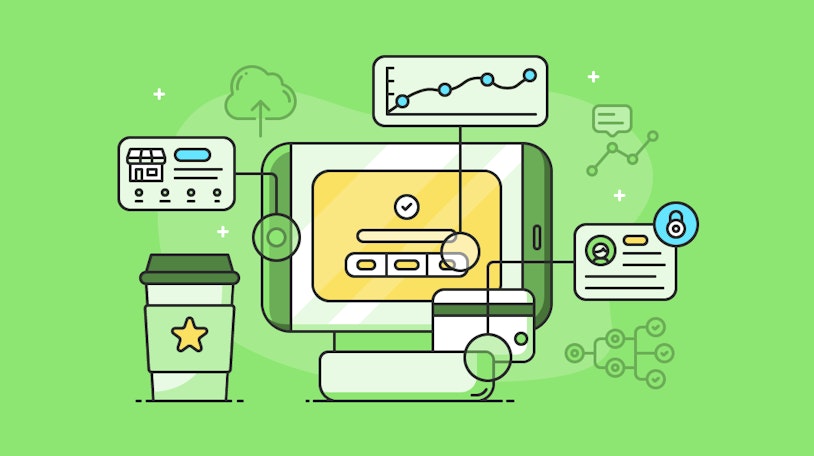The 7 Best CRM Platforms Compared (2023)


Business is all about relationships. When you’re small, keeping track of all your contacts and staying in touch is somewhat simple. However, as your business grows along with your contact list, something that was manageable once upon a time can quickly become unwieldy.
Using Excel sheets and the like can help you manage for a time, but eventually many teams find those solutions leave something to be desired. For most, the next logical step from a spreadsheet is a CRM.
What is a CRM?
A CRM (customer relationship management) is a software tool that helps businesses track communications and manage relationships with customers and prospects. Though a number of different teams could use a CRM, they’re most commonly used by sales and marketing teams for one-to-one and one-to-many communications.
For example, a sales team might send prospecting emails through a CRM. They also generally use them to keep track of where a prospect is in the buying journey and to keep track of the different actions they’ve taken like calls made, notes on conversations, and other pertinent information.
Marketing teams generally use CRMs to send out one-to-many communications. For example, they might use it to send product updates to customers, inform people about an upcoming sale, or invite folks to an event.
In both cases, it helps teams keep track of all the communications they’ve sent in one central place. CRMs are also used to keep customer and prospect information like where someone works, what their job is, where they’re located, contact information, and other details.
What are some important CRM features to look for?
Depending on your specific use case, some features may be more important than others, but there are a few that we consider must-haves no matter what. Those are
An intuitive interface.
Analytics.
Automations.
A simple setup.
Intuitive interface
The fact of the matter is that if something is difficult to use, people won’t use it. In fact, one study found 55% of sales reps said ease-of-use was the most important feature of a CRM. You can read reviews and watch demos of the product in use to see how it works. If there’s a free trial available, consider signing up. Getting hands-on with a product will always be the best way to understand usability.
Analytics
A big part of what makes a CRM so valuable is that it helps you track and optimize the customer journey. Look for tools that let you track things like email open rates, drop-off statistics, and overall engagement rates.
Automations
Manually sending messages and updating contact information eats up a lot of time and reduces the amount of focus your team members have for higher-impact activities. Seek out options that allow you to automate tasks like sending follow-up emails and routing incoming leads to sales reps.
Simple set up
Tools that are quicker to set up are less resource-intensive and allow teams to hit the ground running. This is important for smaller teams because they generally don’t have the resources needed to set up highly complex systems. If you’re a larger team needing lots of customization, look for options that include team onboarding and additional support for implementation.
The 7 best CRM tools on the market today
There are quite a few CRMs available on the market today. Just like most tools, some excel more in certain areas than others. With that in mind, we put together a list to cover a variety of use cases, company stages, and team sizes.
Help Scout
Salesforce Sales Cloud
HubSpot CRM Suite
Zoho CRM
Vtiger
Less Annoying CRM
Copper
1. Help Scout
Best CRM for customer-focused teams.
Though Help Scout isn’t a classic CRM, it does contain a number of features that help it serve a similar purpose. For example, customer profiles let you see all the conversations you’ve had with a particular person. You can also add contact information to a customer profile so agents can see things like where someone works and what their job title is.
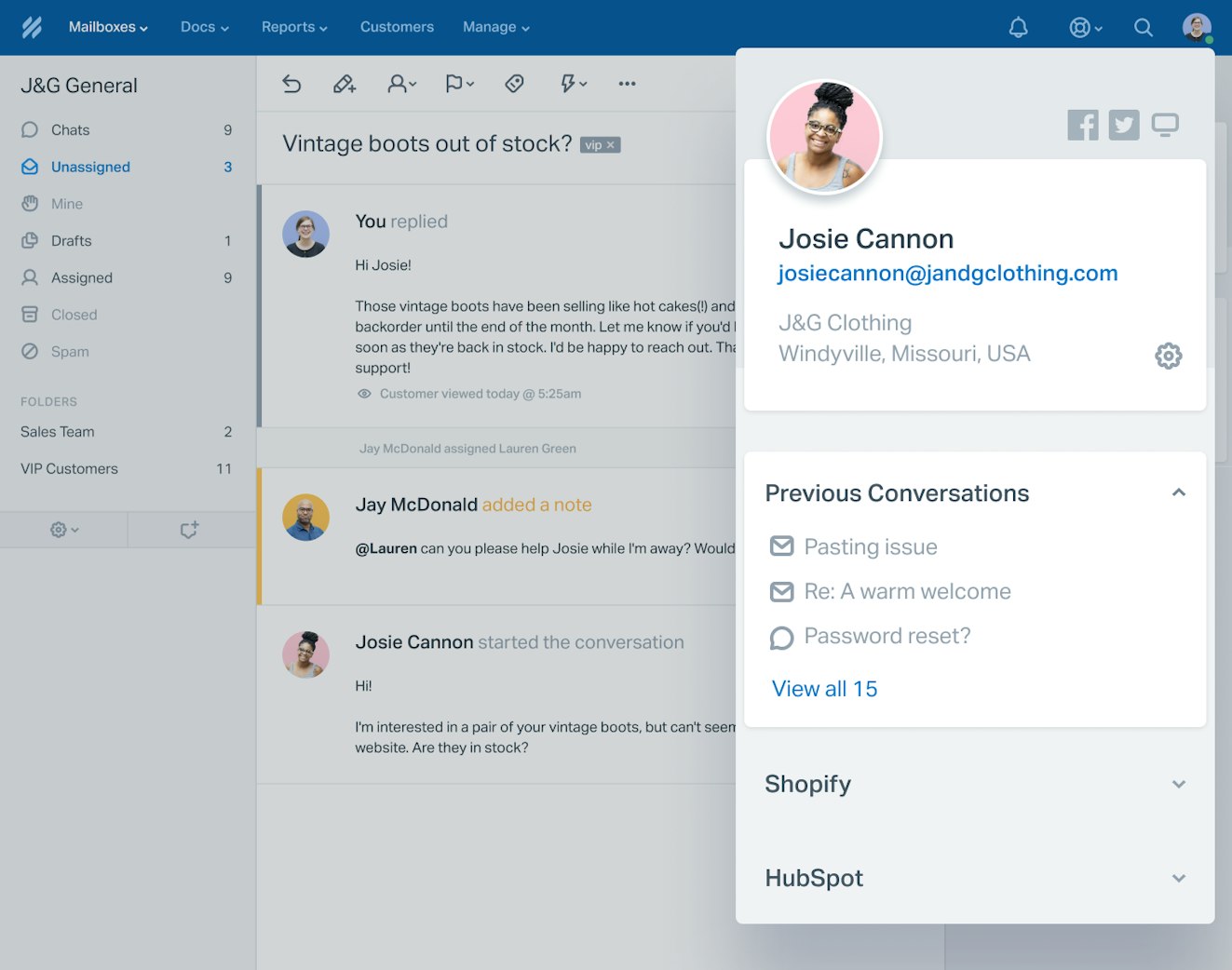
Along with getting some basic CRM functionality, you also get access to the rest of Help Scout’s powerful features like a shared inbox, live chat, AI capabilities, a knowledge base builder, and more. With Help Scout you can serve customers from a variety of places, empowering you to continually create strong connections and lasting relationships.
Price: Free trial available. Plans start at $20/user per month.
Learn more about Help Scout:
2. Salesforce Sales Cloud
Best CRM for enterprise-sized teams.
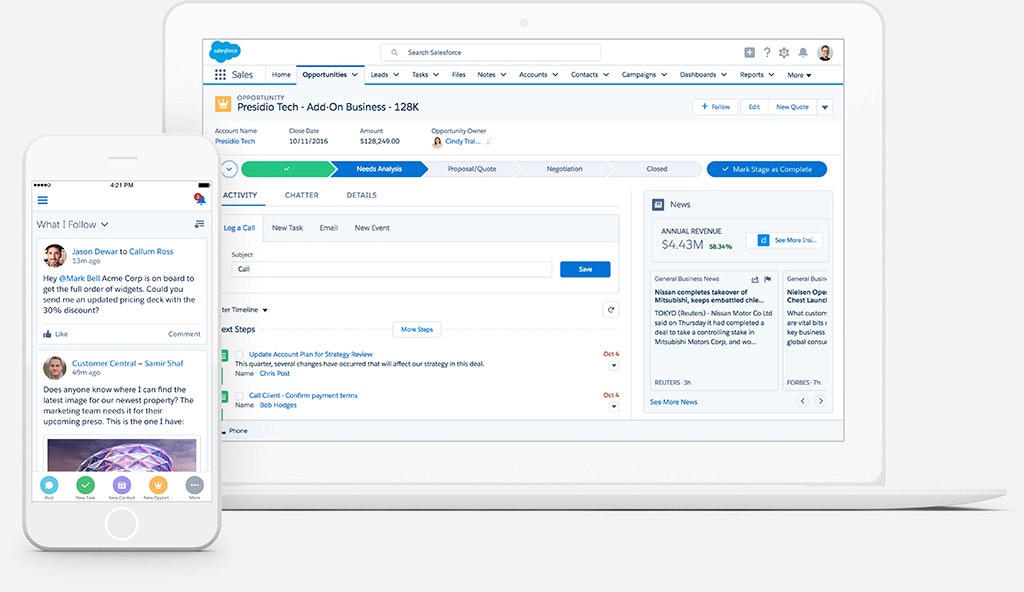
Salesforce is arguably the most recognizable name in the CRM space. They offer a variety of tools for workflow automation and analytics tracking. They also offer an AI assistant on certain plans that automatically does things like lead scoring and calculates deal health along with some other functions.
Though Salesforce is a very robust product, it’s also a very complex one. They have a lot of different plans and add-ons, which can be confusing to navigate. For larger teams it’s even fairly common to have someone whose entire job is managing Salesforce. If you have the resources, it might be worth it, but it is something to consider.
Price: Free trial available. Plans start at $25/user per month.
3. HubSpot CRM Suite
Best CRM for marketing teams.
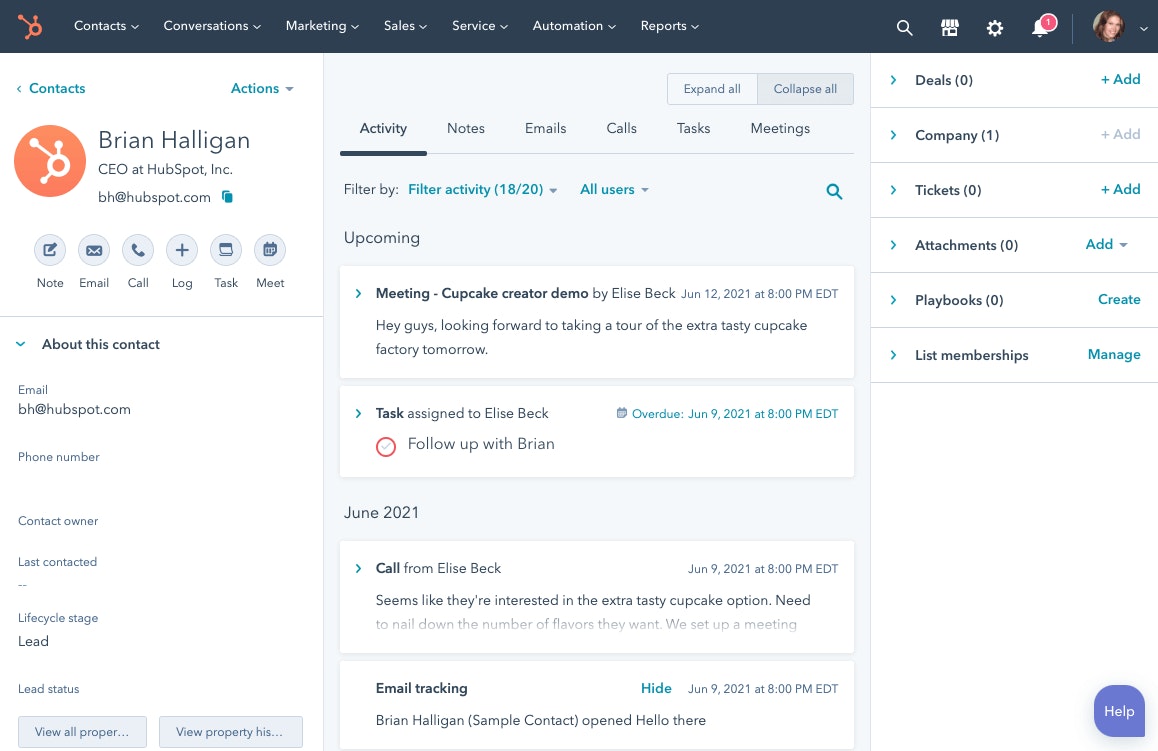
Similar to Salesforce, HubSpot is a well-known name in the industry. They started off mostly as a marketing tool but have expanded into a few different areas over the years. With HubSpot you get a lot of the common CRM features like contact management and workflow automations. However, there are some additional marketing tools that make it well-suited for that use case.
For example, with HubSpot you can create landing pages and get access to tools for ads and SEO optimization. You can also create multiple reporting dashboards to track different analytics for different teams. However, as it is with Salesforce, having lots of functionality also means there’s a decent amount of complexity during setup.
Price: Free plan available. Paid plans start at $45/user per month.
4. Zoho CRM
Best CRM for sales teams.
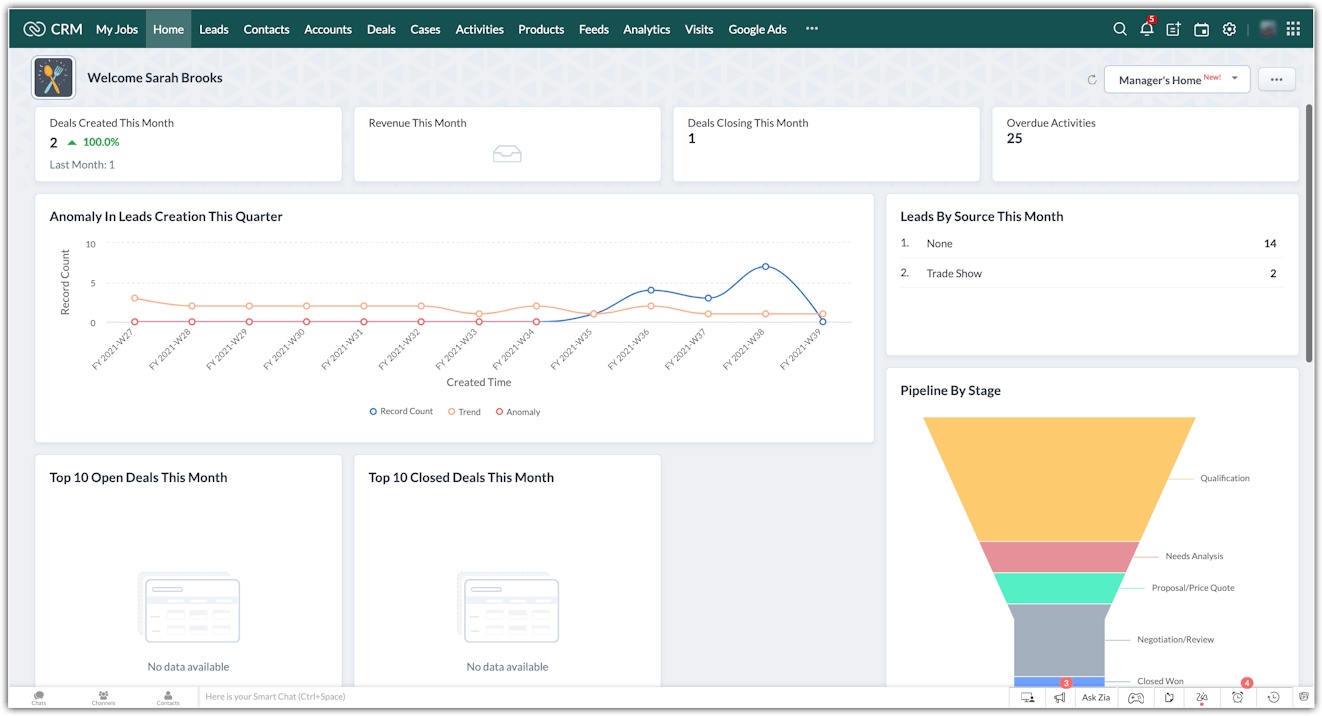
Zoho has been making CRM software for a number of years. Similar to others on the list, they’ve slowly expanded into other areas, but they got their start with sales software. Their CRM has a few unique features, one of which is Blueprint, which lets you create guides for all the parts of the sales process to help reps close more deals.
They also offer predefined reports and dashboards to make performance tracking simple, and they offer the ability to create custom reports, too. You can even leverage their email parser tool to automatically pull someone’s contact information into your CRM from their email signature.
Price: Free trial available. Plans start at $14/user per month.
5. Vtiger
Best free CRM.
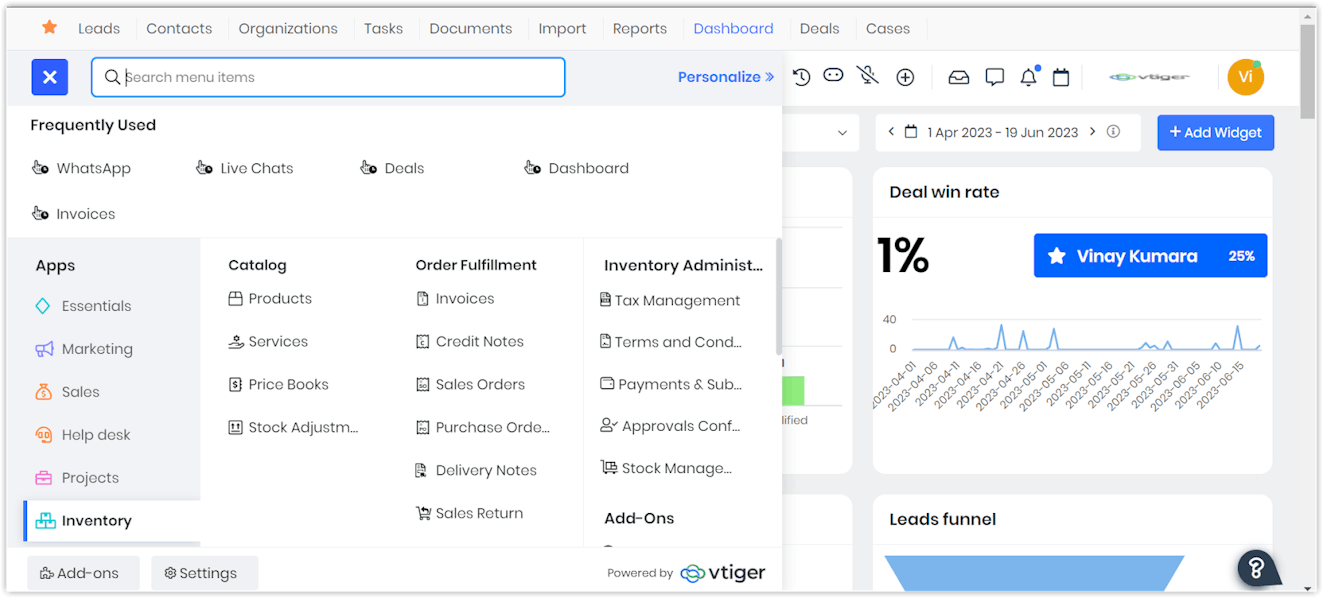
If you’re just starting out with a CRM and don’t have a ton of budget to spend, Vtiger might be a good option to check out. They have a variety of plans, but their free plan is pretty comprehensive and gives access to tools for sales, marketing, and customer service.
There are contact limits on the free plan (3,000), and there aren’t many advanced automations or routing features like with other options. That said, you can still do lead scoring, build email templates, and set up an autoresponder. You can also see how long a prospect has been in a certain deal stage and get notified if a lead goes cold.
Price: Free plan available. Paid plans start at $12/user per month.
6. Less Annoying CRM
Best CRM for small teams.
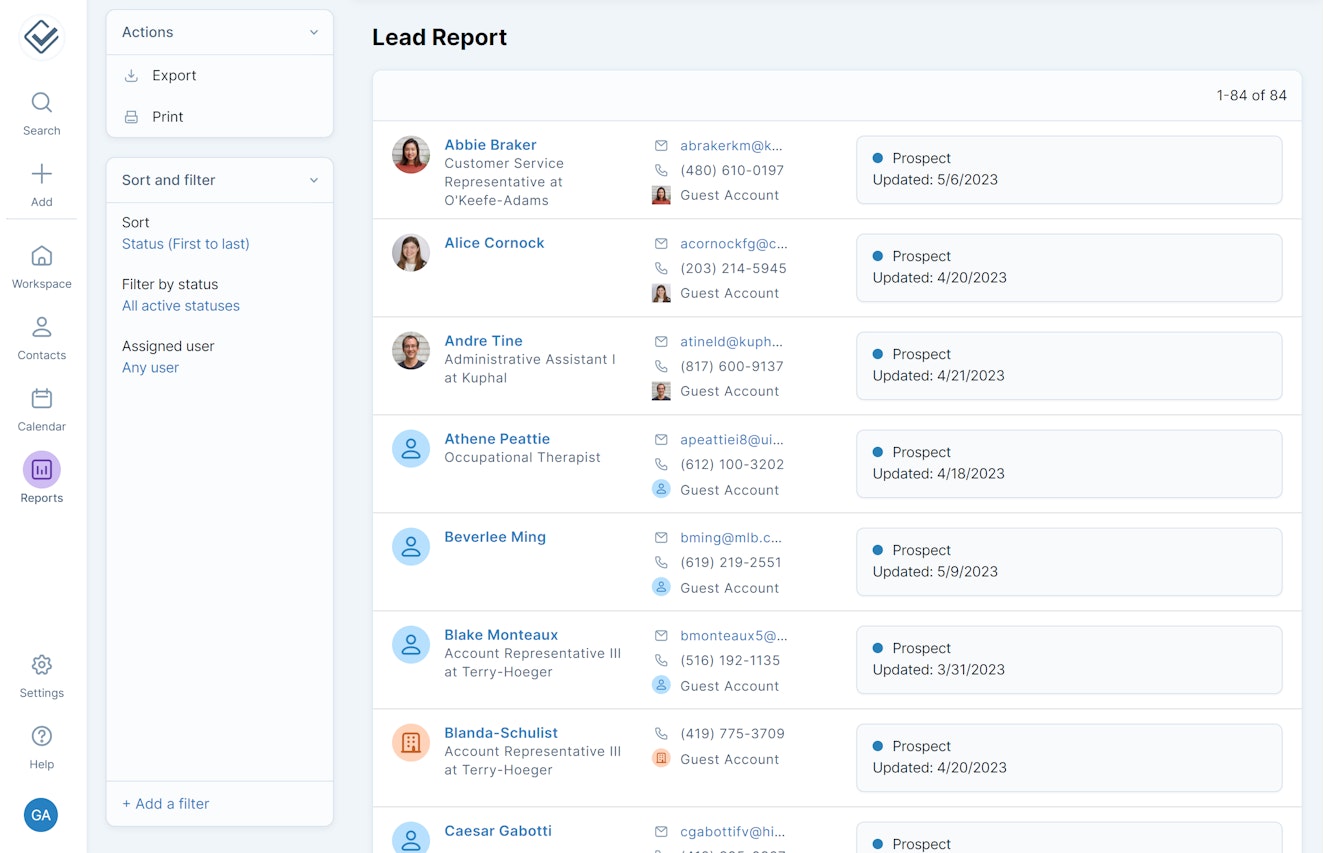
Though long lists of high-tech features can be impressive, for a lot of teams they’re not totally necessary. And, the more software does, the more there is to manage. Depending on your team size and resources, that’s not always an option. In those cases it’s generally better to have something on the simpler side of things. That’s what Less Annoying CRM is for.
Less Annoying CRM offers a number of features like contact management and automated lead reports to stay on top of your pipeline. There are customization options, but they’re all no-code required. And if you ever run into an issue, they have support reps ready to answer your questions by phone or email. Also, they only have one plan with no additional add-ons, making pricing super simple.
Price: Free trial available. Plans start at $15/user per month.
7. Copper
Best CRM for teams using Google Suite.
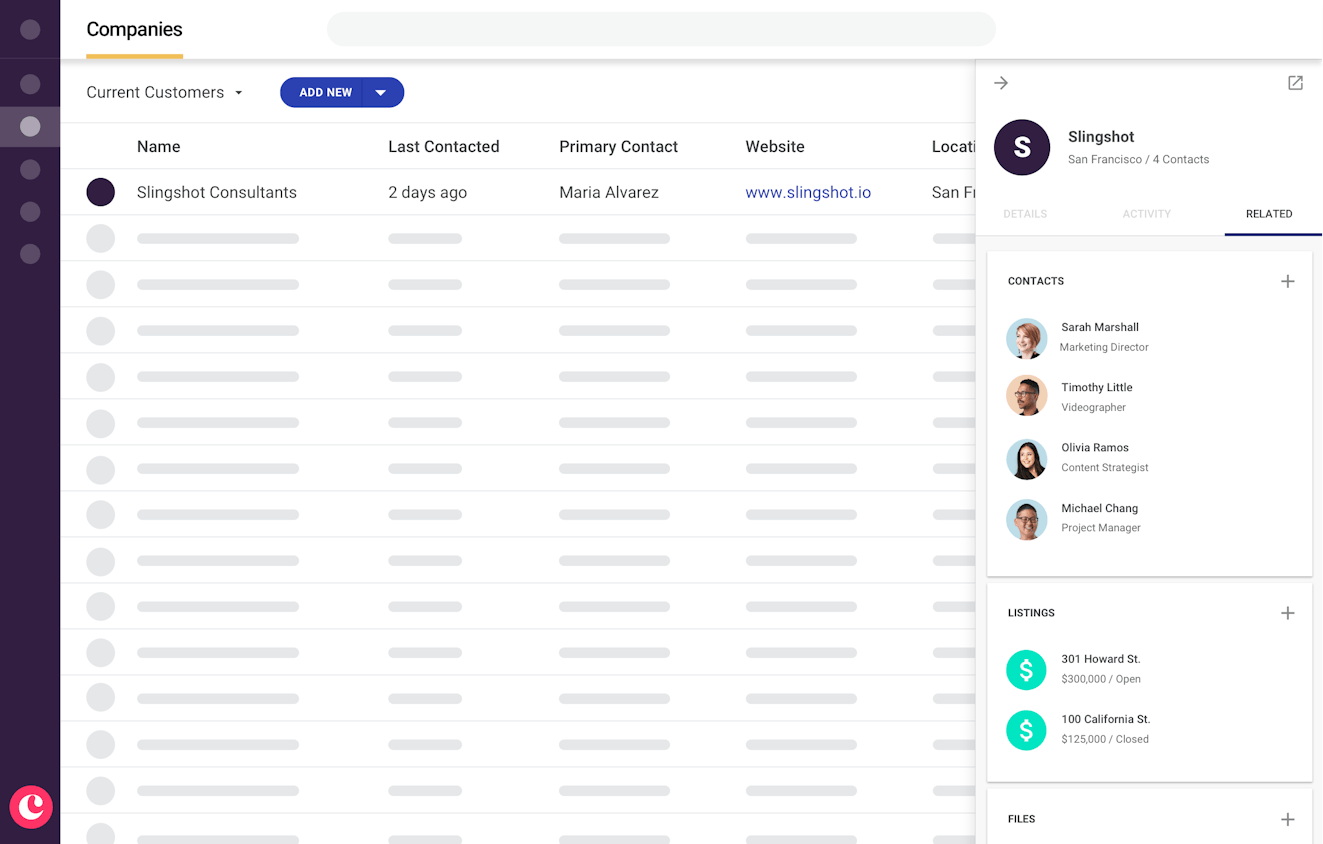
Copper CRM is essentially a Gmail extension that gives you CRM capabilities. With it you’re able to send bulk emails, track open rates, and create contacts. You’re also able to see past interactions with each of your contacts. You can also tag people to segment them into categories like VIPs.
Along with those email tracking and contact management features, you’re also able to create automated workflows to do things like update deal statuses and automatically create tasks based on certain actions. You’re also able to create customized analytics dashboards to better understand performance, though that feature is limited to their higher cost plans.
Price: Free trial available. Plans start at $23/user per month.
Final thoughts
Strong relationships are the cornerstone of a successful business. Without the right tools to manage, maintain, and optimize those relationships, there’s little chance you’ll reach your full potential. Investing in a tool like a CRM helps you stay in touch and top-of-mind for customers.
If you’re looking for a communications platform with CRM features that can help you have better conversations with your customers, consider Help Scout. Our 15-day free trial is a great way to see if our solution is right for you.
